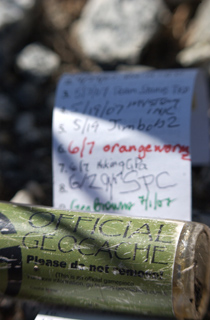
High-tech toys power burgeoning hobby
There’s treasure to be had out there. Never mind that much of it
amounts to nothing more significant than McDonalds Happy Meal toys.
The thrill is in the hunt, and countless people are hunting all
around us.
High-tech toys power burgeoning hobby
There’s treasure to be had out there.
Never mind that much of it amounts to nothing more significant than McDonalds Happy Meal toys. The thrill is in the hunt, and countless people are hunting all around us.
They’re geocachers, seeking out ammo cans, Tupperware containers, old pill bottles and the like tucked into crevices everywhere. It’s called geocaching, and participants use portable global positioning system (GPS) units to home in on hiding places, then log their finds on concealed logbooks and a popular internet site, www.geocaching.com. It is through the same site that participants typically download the location of caches before going on the prowl. There are caches at Hollister Hills State Park, near abandoned mines in New Idria, in local cemeteries, and just about anywhere else a small container can be squirreled away.
Hollister and San Juan hold a host of them. Even tiny Tres Pinos merits a few.
Michael Rodriguez, a father of two, has been a geocacher for three years. He got into the hobby after a friend who is an avid outdoorsman took him on an excursion.
“He’d been talking about it for a while,” Rodriguez said. “When we finally went out it was instantly cool. The things you find and the cool spots you’d never see otherwise.”
Born a decade ago in Seattle, the game is now worldwide.
The hider notes the cache’s coordinates and those coordinates, along with other details of the location are posted on the geocaching.com Web site. Everyone who does not participate in the game is declared a “muggle,” and most players take pains to conceal their business from the uninitiated. Caches that are removed or vandalized are said to have been “muggled.”
Geocachers are free to take objects from the cache in exchange for leaving something of similar or higher value, so there is treasure for the next person to find.
A typical cache is a small waterproof container containing a logbook and sometimes even “treasure” usually toys or trinkets of little or no value, but occasionally items of significant worth.
There are many types of caches. Some are easy enough to be called “drive-bys,” “park ‘n’ grabs” or “cache and dash.” Others are very difficult, including staged multi-caches; there are even examples of caches underwater, 50 feet up a tree, after long off-road drives, on high mountain peaks, on the Antarctic continent and above the Arctic Circle. Different geocaching Web sites choose to list different variations as per their own policies.
More than 440,000 geocaches are registered on various websites devoted to the sport, according to a geocaching Web site. Geocaches are currently placed in 222 countries around the world and on all seven continents, including Antarctica.
Rodriguez has found around 300 caches during the three years he has been a geocacher, but he has friends who have discovered more than 1,000.
“It’s instantly cool,” Rodriguez said. “The things you find and the cool spots you’d never see otherwise. Some [caches] are hidden in parking lots, but others are at places like Mount Madonna and Henry Coe parks. Some are in parks I’d never have known about otherwise.”
That’s the particular element that appeals to Rodriguez the most. The thrill of finding new places that he was never aware existed.
“Some of the places people take you,” Rodriguez said. “I wonder how did they even know that was there? One of the coolest caches I’ve ever found was inside a cave out on Hwy. 120 on the way to Yosemite. It was small, so I had to crawl in there. Nobody else in my family wanted to go with me.”
Geocaching is a fairly inexpensive hobby with little startup costs. A low-end GPS device can be purchased for around $100 or often geocachers will list their old devices on the forums at www.geocaching.com.
One place you won’t find any new geocaches is at Fort Ord. The Bureau of Land Management has issued an emergency closure of public lands at Fort Ord to the establishment of new caches. The closure will remain in place until the BLM has crafted a suitable long-term policy governing the geocaching sport on BLM-administered lands at the former military base.
“The emergency closure is being put in place to protect the public from contact with potential munitions and explosives of concern and to deter off route travel which could impact sensitive plant and animal species on the Fort Ord Public Lands,” said Eric Morgan, BLM’s Fort Ord Manager.
The BLM is also evaluating existing geocaches to determine if there are immediate issues concerning public safety and resource protection.








